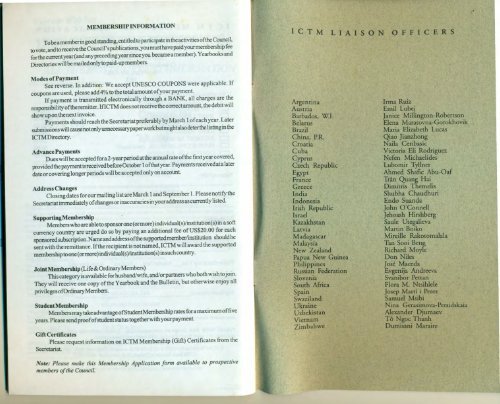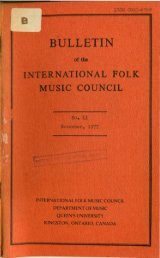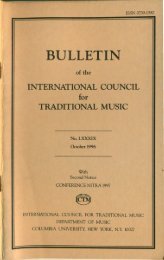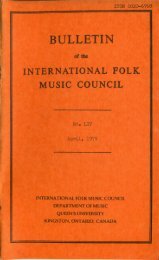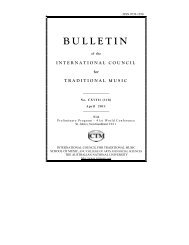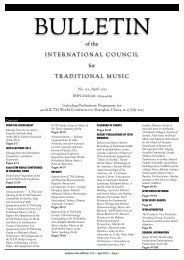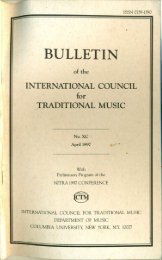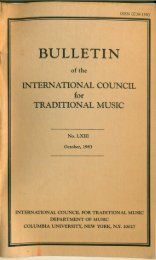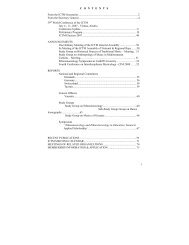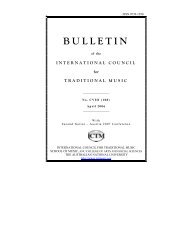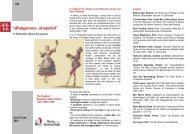Apr 1999 - International Council for Traditional Music
Apr 1999 - International Council for Traditional Music
Apr 1999 - International Council for Traditional Music
- No tags were found...
Create successful ePaper yourself
Turn your PDF publications into a flip-book with our unique Google optimized e-Paper software.
REPORTS 2. K. Malm, Copyright and the protection of intellectual property intraditional music. A summary of international ef<strong>for</strong>ts.3. D. Lundberg, Virtual Community. Assyrian music, nationalism andUNESCO CONFERENCE Power of CultureStockholm 30 March - 2 <strong>Apr</strong>il 1998The intergovernmental Power of Culture conference on cultural policies<strong>for</strong> development was a conference at ministerial level. It brought togethersome 2400 participants representing 149 governments, 23 internationalinter-governmental organizations, some 135 non-governmental organizations,foundations and other civil society entities as well as many individualartists, scholars and experts. The point of departure <strong>for</strong> the conference wasthe report "Our Creative Diversity" by the World Commission on Cultureand Development. At the end of the conference the participatinggovernments agreed on an Action Plan on Cultural Policies <strong>for</strong> Development.This plan specifies actions within five policy objectives:1. To make cultural policy one of the key components of developmentstrategy.2. Promote creativity and participation in cultural life.3. Rein<strong>for</strong>ce policy and practice to safeguard and enhance the culturalheritage, tangible and intangible, movable and immovable, and topromote cultural industries.4. Promote cultural and linguistic diversity in and <strong>for</strong> the in<strong>for</strong>mationsociety.5. Make more human and financial resources available <strong>for</strong> culturaldevelopment.The plan also has a number of recommendations to the Director-Generalof UNESCO, among them that he should "Take the present Action Planinto account when preparing UNESCO's future program" and "Elaboratea comprehensive strategy <strong>for</strong> practical follow-up to this Conferenceincluding the possibility of not to organize a World summit on culture anddevelopment" .At the conference ICTM through its Swedish National Committeeorganized two so called Agora sessions in cooperation with the RoyalSwedish Academy of <strong>Music</strong> and its research project <strong>Music</strong> - Media -Mulriculrure, The subject matter of the sessions was different aspects ondiversity in music and music life, especially in traditional music. Thesessions were well attended.In each session presentations by the members of a panel were mixed withperiods of general discussions. The panelists/presenters were ICTMmembers Dan Lundberg (Sweden), Krister Malm (Sweden), OweRonstrorn (Sweden), Anthony Seeger (USA) and Ricardo Trimillos (Philippines).At the session a printed document was distributed to allparticipants. This document contained three key papers:1. A. Seeger, Ethnomusicologists, archives, professional organizations andthe shifting ethics of intellectual property. .1Internet.(This documentcan be ordered from the Swedish Ne.)Session Tuesday, March 31, 10.00 - 13.00MUSICAL DIVERSITI AND RIGHTSThe fact that music now at an increasing pace moves across boundaries andborders reveals both profound common factors in human behavior and anumber of totally different notions around music. The session focused onthe huge variety of notions on creation, ownership, use etc. of music.The panelists gave some examples of cases where the traditional notionsof ownership are quite different from those manifested in the internationalcopyright conventions and thus have come into conflict with the latter.The cases were traditional Hawaiian music (Trirnillos), the Suya Indiansof the Amazons (Seeger) and traditional fiddlers in Scandinavia(Lundberg/Ronstrorn). Malm.gave a survey of ef<strong>for</strong>ts to deal with theconflict between the current concept of "public domain" in internationalcopyright legislation and traditional concepts of ownership.The discussion centered on questionssuch as:How can we deal on the national and international level with this diversity?What are the implications of multiculturalisrn?Can we solve the tensions resulting from the clash of values betweeninternational copyright legislation and non-Western and folk musicaltraditions?Is it possible to stop appropriation and exploitation?Can an international agenda be designed that takes into account the hugevariety in thinking around music?Are there universal principles that could serve as a foundation <strong>for</strong>international cultural policies?There was a general consensus that WIPO in cooperation with otherorganizations should start regional consultations in line with the so calledPhuket Plan of Action in order to find ways to amend the BerneConvention to better accommodate different notions of ownership. Therepresentative of WIPO present at the session not only agreed to conveythis message to his organization but also announced that WIPO wasprepared to arrange such regional consultations. For the ICTM this was ofcourse a pleasant outcome of the session.Session Tuesday, March 31, 15.00-18.00DIVERSITI IN MUSICAL TRADITIONS - CURRENT SETTINGAND TRENDSThe aim of this session was to introduce and discuss some of the recentscholarly findings on the impact of technology, commerce, internationallegislation, political frameworks and other similar factors on the patternsof change in musical traditions. The session dealt with musical aspects of26 27


